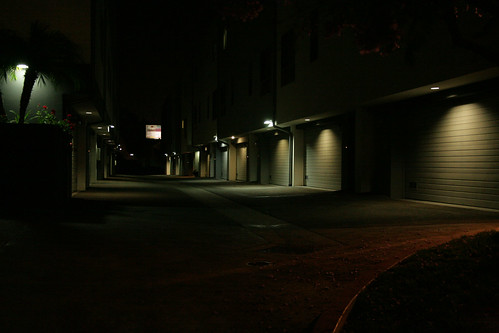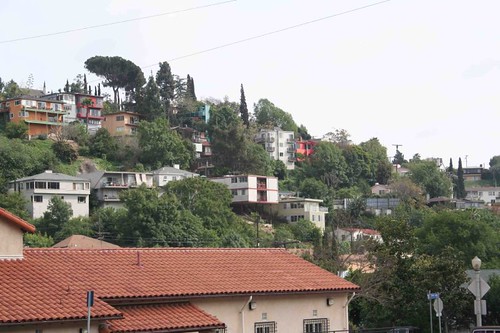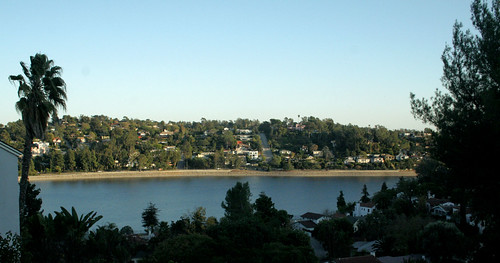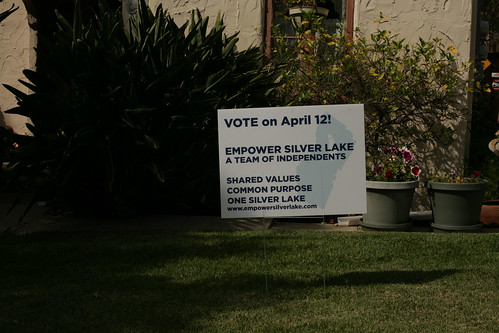
The final candidates' forum that I had to attend in the run for my local Neighborhood Council was put together by another of my team mates who got the Community Police Advisory Board to sponsor and moderate the event. Just the fact that the police or anything associated with law enforcement had anything at all to do with the forum was very annoying to several of the other candidates who were running. They called their slate, “Yours, Not Ours,” but it seemed more like “Us vs. Them” to me, and I began referring to them by that name. There were some members of that slate who were decidedly anti-police. I won’t speculate upon the reasons that they felt that way, but you are free to do so, if you wish. The forum was held just a week before the election. It was to have a different format than the previous one with the candidates given one minute for an introduction, one minute to answer the question “What do you feel are the three most important issues facing Silver Lake residents?”, and thirty seconds for a final comment. After my research, study and previous experience, I felt ready for this meeting.
When I arrived at the elementary school auditorium where the forum was being held, I signed in and found a seat at the front of the room with the other candidates in attendance. I was able to sit next near a couple of my fellow team members, so there was less of that “venturing into hostile territory” feeling that I get when I find myself among the hard-core leftists. As the forum began, the first thing we learned was that the format had changed. Instead of what I had anticipated from the information I had received, the forum would now consist of a very short introduction, two questions gleaned from the audience, and a short final comment. It didn’t matter. A scan of the audience revealed to me that it was comprised for the most part of “Us vs. Them” partisans.
Given the make-up of the audience, I knew that the questions the candidates would be asked to address would have nothing to do with issues, but, instead, would be intended to give the hard-left-slate candidates a platform from which to espouse their message. To that end, one of the questions to which we were asked to respond was “How do you plan to reach out to the community?” In other words, how would I determine what the greatest “needs” in the community were as envisioned by the lowest common denominator of the “stakeholders.” Stakeholder is defined as anyone with vague interest in the community, which could include people who shop there, work there, drive through, exercise there, receive services there, live there, rent there, or, in other words, anyone who claims to have a stake in the community. I answered that one with the idea that through a Neighborhood Watch program people could learn to communicate with each other and solve their own problems, rather than stand around with their hand out waiting for their Neighborhood Council representative or other city or federal employee to help them. My idea was met with overt derision. I expected nothing more. My final comments were spent restating my belief that the last thing in the world anyone needed was another layer of useless, parasitic city government. I was hoping to plant the thought in the audience that it might be possible to succeed in life without the aid or reliance upon any sort of government assistance. I don’t believe I found any fertile soil for such a seditious seedling. I was glad that this was the last time I would have to sit among what I consider enemies of freedom and self-reliance.
At this point, I had seen and experienced, at the most local of levels, the inner workings of left-wing politics. It was not an appealing sight. In my view, both sides of this race had essentially the same core values, none of which I agreed with. I liken them to two groups of arsonists debating which brand and what quantity of gasoline they each want to add to the fire which is burning America to the ground. The only chance I had of being elected was if I was carried in by my association with the higher-quality, less quantity of gasoline crowd who had recruited me.
Election day arrived and even that was a complete fiasco. One of the issues that came up during the run-up to the election was the number and location of the polling places. Some of the people on my end of the neighborhood thought there ought to be two polling places, one on the north end and one on the south end. The people on the south end of Silver Lake assumed a full-on victim stance and claimed that the people on the north side were all rich, white people who would all turn out to vote and deprive the alleged poor people on the south side of any representation on the council and so the only polling place ought to be on the south side. Given the nature of Los Angeles politics, the city bureaucracy that runs the neighborhood council system decided that there would be only one polling place and that it would be on the south side of the neighborhood. Add to the mix the fact that the person in charge of administering the election was a very vocal “Us vs. Them” partisan and the result is that the group I was involved with never had a chance. This particular election administrator had to be removed from the polling place on election day for electioneering for her friends. Finally, the parking lot, which was supposed to be open and available that day was, instead, in use for some unrelated event. There was an alternate parking lot across the street, but that information was known to only the election administrators and not to the voters. To sum it up, there was only one polling place at the south end of the neighborhood, there was evidently no parking available at that location, and the Us vs. Them partisans were shilling for their candidates right inside the polling place. As you might suspect, the Us Vs. Them folks won the day.
Surprisingly, I got 299 votes. I have no idea how that happened. I’m quite sure I didn’t talk to anywhere near that many people. I was just carried along on the wings of the group I was associated with. When I got the results of the vote, I was relieved at the thought of not having to spend time or energy dealing with the madness that ensues at the Neighborhood Council meetings. I don’t enjoy arguing politics with people who have no fundamental knowledge of how government works and who have no idea what actually motivates people. There was one last loose end, though. I was still an official co-chairperson of the Public Safety Committee. That meant that I was still associated with the Neighborhood Council. I needed to find a way to either come to terms with that association, or gracefully bow out of it.
After the election, I got an e-mail from my Public Safety Committee co-chairperson asking for my thoughts on what we should do with the committee in the coming months. I sent along the following:
Proposed Public Safety/CERT Program
Rotating Emergency Preparedness meetings.
1. South Silver Lake – location(s)?
2. North Silver Lake – location(s)?
3. Year-long Agenda along CERT training/awareness lines.
a. Push people into CERT classes
b. Get people thinking about emergency preparedness
i. Series of different instructional meetings
4. Attendance at community events
a. Need booth furniture
b. Need preparedness handouts
c. Need CERT literature
5. Publicize Meetings
a. Echo Park-Silver Lake Patch
i. Contact: echopark.patch.com
ii. Deadline: none
iii. Monthly events can be added to their calendar through my account.
b. The Eastsider
i. Contact: www.theeastsiderla.com
ii. Deadline: none
iii. Monthly events can be added to their calendar seemingly free
c. The Laist
i. Contact: Doesn’t have a calendar section.
d. Los Feliz Ledger
i. Contact: Allison Ferraro – e-mail sent – no response.
ii. Deadline: unknown
e. South Silver Lake paper?
i. Contact
ii. Deadline
f. Community Bulletin Boards
i. Locations: SL Library,
g. Laundro-Mat Bulletin Boards
i. Locations:
i. Other places
Neighborhood Watch Groups
1. Presentations to local community groups
2. Help with formation and organization of new groups
3. Alliance meetings of key group leaders
4. Work with Paul
5. Promote National Night Out for each area
Lecture Series for Emergency Preparedness Meetings
Notes:
Each should stand alone, but taken together form a body of knowledge on the subject.
Lecture 1:
What is a disaster? Cover everything from broken cars to earthquakes to civil unrest. Get a discussion going on what might happen in each case. How bad could it get? Where might you be? Home, office, school, freeway? What would you need to be prepared? Supplies? Hazards? Discussion. Hand out personal supplies list, family supplies list.
Lecture 2:
Personal preparedness and community preparedness. We’re all in this together. Disaster scenario. Neighbors can help each other survive. Each person has something to contribute. Everyone needs to be prepared so that resources can be shared. How would you talk to your neighbors about this?
Lecture 3:
Getting your home ready for an earthquake or other disaster. Fire suppression, escape routes, rally points, hazardous materials, securing heavy objects, safety, shutting off gas and electricity, evacuation. Bug out bag for evacuation. Discussion.
Lecture 4:
What will you do if the city resources are overwhelmed and you are on your own in a disaster? What skills do you need to have? What can you do to prepare? What will you need to survive? Food, water, sanitation, security, light, communications. Discussion.
Lecture 5:
Talking to your neighbors about Emergency Preparedness. How to approach them. Talk earthquakes and what happens thereafter. Share information with them. Discussion. Drill with each other on what you might say.
Lecture 6:
If you have to evacuate, what will you need to survive? Go Bags. Get home bags. Daily items you carry on your person. The skills you have will influence what you pack for survival. Discussion.
I received what I considered to be a rather tepid response to my proposal. My co-chair only wanted to work on getting a Neighborhood Watch group started at a senior center on the south end of the neighborhood. I thought that, perhaps, my proposal seemed a bit too ambitious to my co-chair. I agreed that we should get that Neighborhood Watch group going and pressed for a date for the next meeting. As the days went by and no date was set for the Neighborhood Watch meeting, I offered a proposal for a presentation I might give for the upcoming committee meeting. That also received a tepid response and was followed with my co-chair deciding to cancel the next committee meeting. There was no communication between my co-chair and the Neighborhood Council to let them know that the meeting would be cancelled. Finally at the last minute, they were informed and the cancellation notice was published. I continued to follow up with my co-chair on what we might do going forward, but got no commitment on an agenda or even on a future meeting. I received a couple of e-mails from my co-chair informing me that he/she was quitting. My response was to lament that fact that several of his/her proposed projects and events would not happen and to ask if that was what he/she really wanted to do. I got no response.
I was left hanging in the breeze, as they say. With my co-chair’s resignation, I was in charge of the committee, a position I had never sought or desired. I felt I had no choice but to make my position known to the Neighborhood Council so that they could find new people to take over the committee. I sent them an e-mail and laid out my position on the matter. As it turned out, my co-chair had never informed them of his/her resignation. I ended up being made the “bad guy” for being honest about the situation. And so, I burned that final bridge in my brief foray into local politics.
The mistake that I made at the beginning was that I neglected to do my research so that I had some idea of what I was getting into by declaring myself a candidate in the first place. Had I done that by attending some meetings, I would never have submitted my name as a candidate. On the other hand, during the course of the campaign, I did meet some good people who genuinely care about Silver Lake. I have no regrets about that aspect of the experience.
I still would like to help my neighbors achieve a better level of preparedness, situational awareness, and communication. I am doing that by taking a more active role in organizing my area of operations for the Neighborhood Watch. It’s a good program, since its purpose aligns very well with my own as far as building community spirit and awareness is concerned. The best part is that there doesn’t have to be any partisan politics involved to create an effective Neighborhood Watch group. I have skills and knowledge I can share with the group and I’m finding that there are things I can learn from my neighbors, too. I can do everything I thought the Neighborhood Council ought to be doing through a Neighborhood Watch program, so that’s what I’ll be doing. I’ve already begun the process and am finding it quite rewarding and interesting. I like helping my neighbors. I like encouraging them to help themselves, to be self-reliant and to be prepared for whatever might happen in our neighborhood. The more my neighbors can take responsibility for their own survival and not depend upon the government for help, the better off we all with be. I consider that a goal worth working toward.







